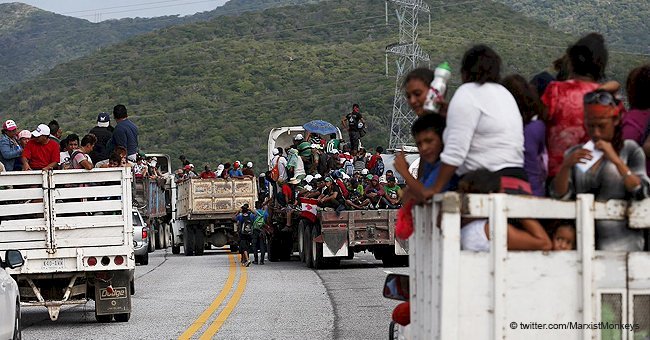
Families of caravan migrants undergo diseases, emaciation and hazard
The harsh life on the road in the Migrant Caravan is taking a devastating toll on families.
As thousands travel through Central America on foot in the now notorious Migrant Caravan, more and more accounts of the difficulties faced by the young and the elderly are coming to light, reported The Guardian on November 2, 2018.
According to observers, the Caravan is split into two contingents, the first totaling approximately 3,500 people, and the second an additional 3,000. The second group consists of family members and unaccompanied children of the people in the first group.
CHILDREN ON THE MARCH
But what kind of conditions are the children in the Caravans subjected to in their parents' desperate march north? The UN estimates that there ate around 2,300 children in the Caravan.
Many of the children travel in strollers, other strapped to their parents' backs, and many more walk by the side of the road, endless miles each day.
SICKNESS, THIRST, AND EXHAUSTION
Parents on the trek explain they have no choice but to bring their children with them on the march to avoid forced recruitment, sexual assault or murder. The Central American towns they are fleeing from are hotbeds of crime and violence, controlled by the gangs and drug cartels.
BORN ON THE MARCH
Many of the children are ill, suffering from persistent coughs, fever and eye infections. One woman gave birth to her baby girl on October 31, in the Mexican town of Juchitán.
SOME MIGRANTS STAYED IN MEXICO
The harsh toll the march is taking on the participants has led hundreds of migrants to give up the US as their final destination and to seek asylum in Mexico. For the many thousands who march on, the challenge is daunting.
Read more on Twitter Amomama USA.
MIGRANTS SUCCUMB TO DISEASE AND DEHYDRATION
Some international organizations like the Red Cross have been succoring the more fragile members of the host. Many are suffering from exhaustion and illness. Despite the fears manifested by some, the World Health Organization has stated that there is little danger of the Caravan spreading communicable diseases.
The illnesses they are suffering from -coughs and colds, blisters and sunburns, and insect bites - are a result of the conditions on the road.
Dehydration and malnutrition are also weakening the travelers since the impoverished area of rural Mexico they are walking through can hardly support itself, let alone succor such huge numbers of visitors.
When the Caravan arrives at the US border in two to three weeks time, America may be faced with a human disaster of unprecedented proportions, with thousands of sick and ailing children on the "doorstep."
